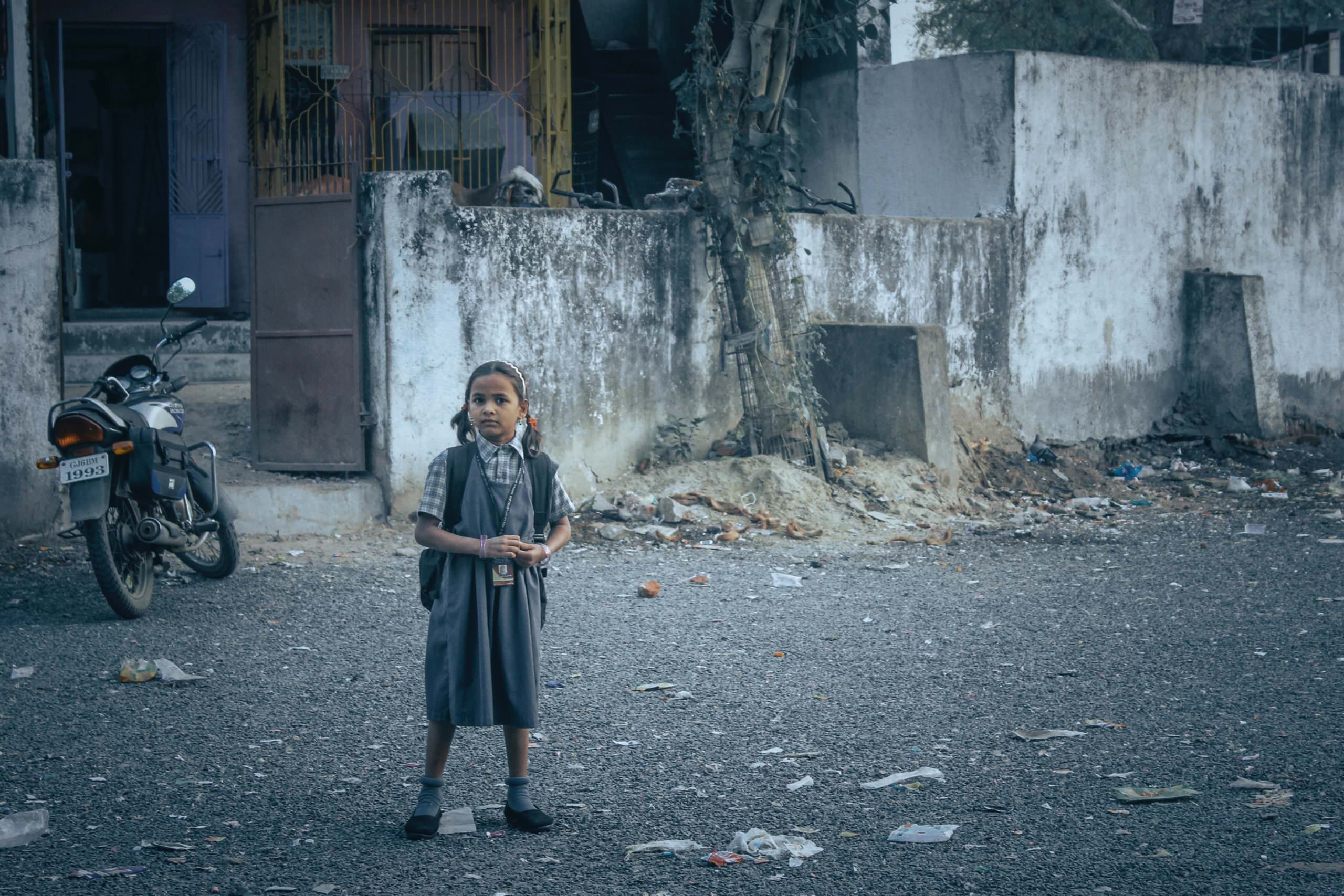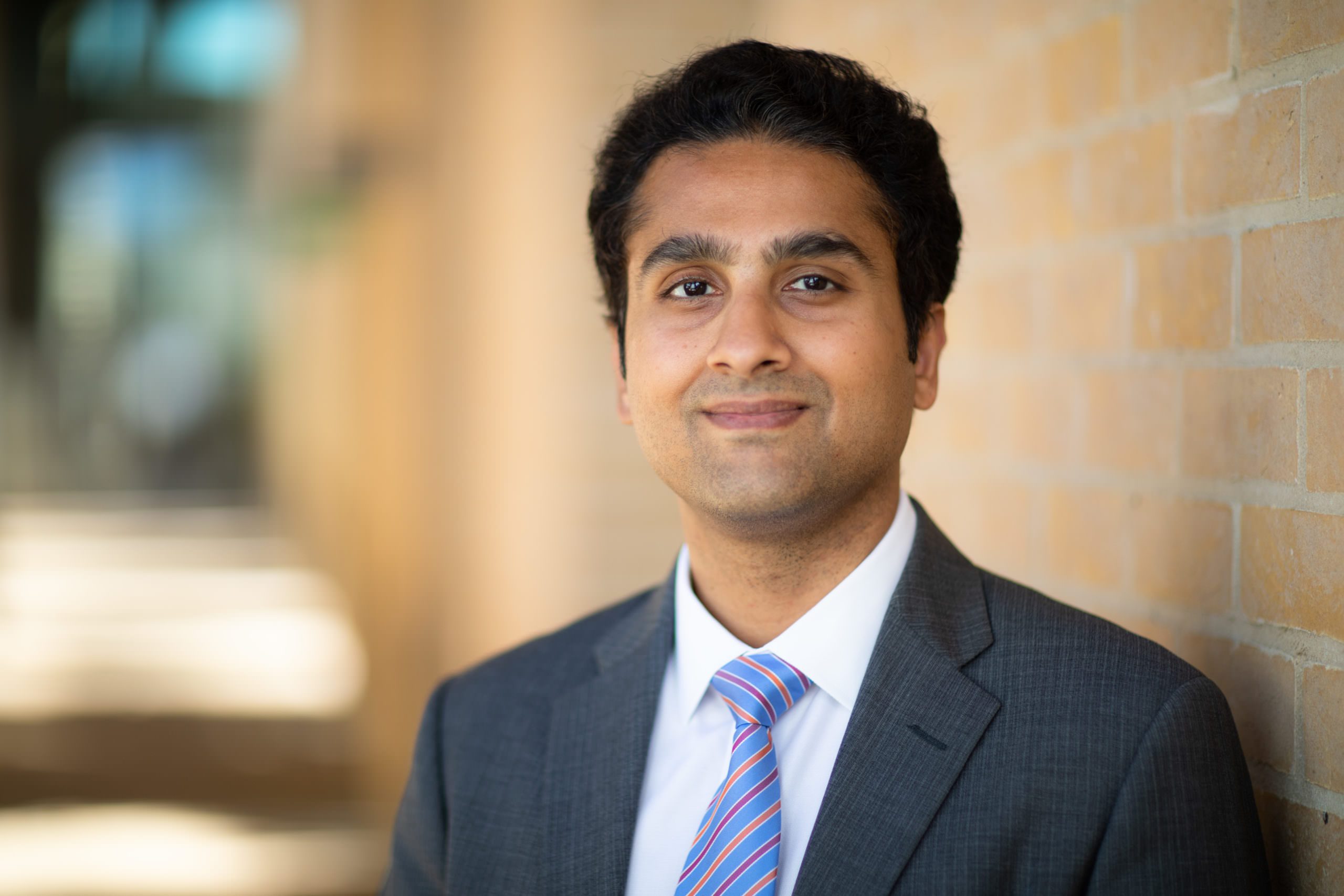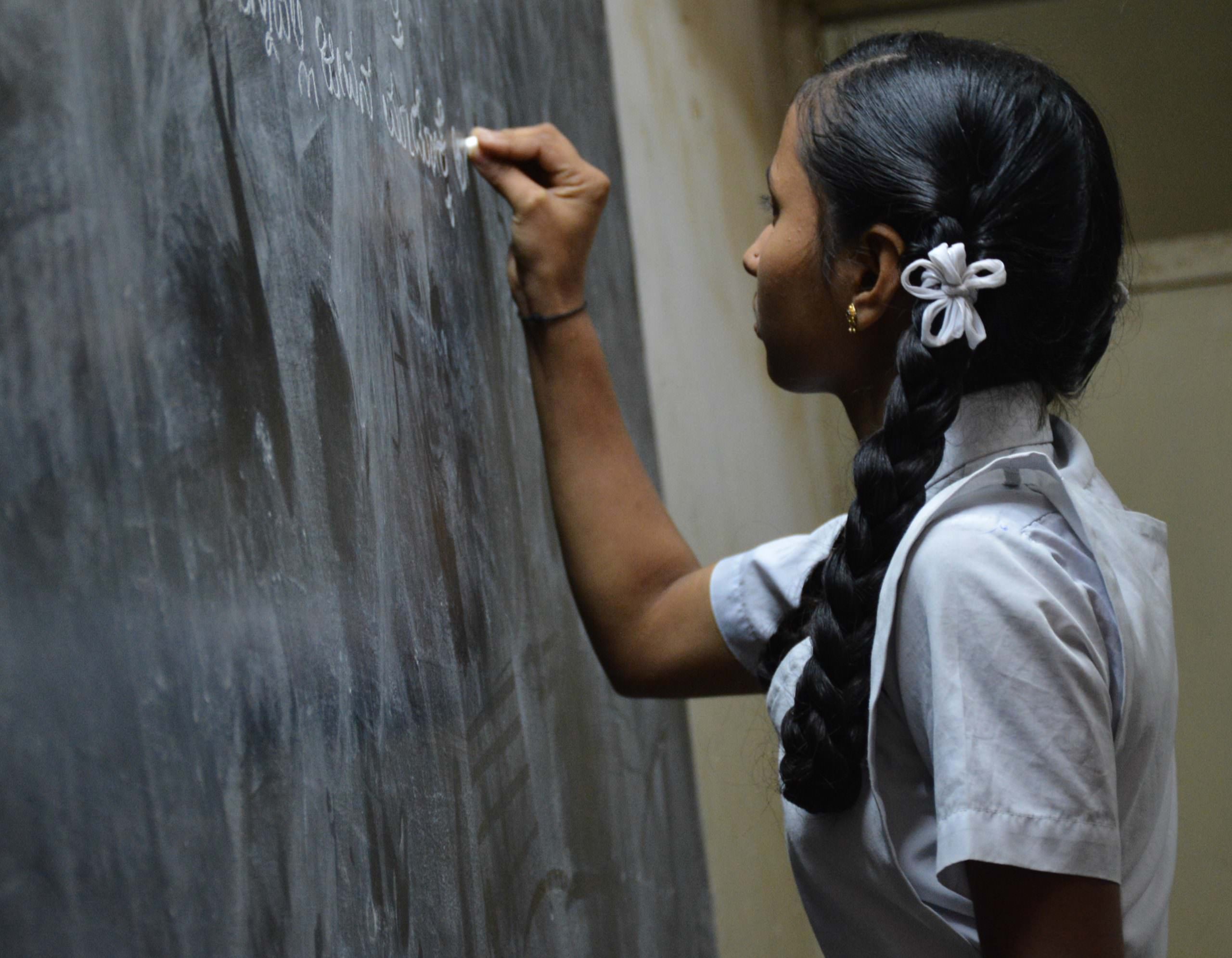
A student in rural India. Photo by Sonu Agvan.
Akshay Mangla, Mittal Institute Research Associate and Associate Professor in International Business at the University of Oxford, recently authored the new publication, “Social conflict on the front lines of reform: Institutional activism and girls’ education in rural India,” in Public Administration and Development. The study analyzes how frontline workers within the Indian state negotiate social conflicts as they seek to integrate disadvantaged girls into the school system by mobilizing village women’s groups and encouraging deliberation with target households. The Mittal Institute sat down with Akshay to explore his recent work, and expertise in the comparative political economy of developing countries.

Mittal Institute: Akshay, can you walk us through your new research? You set out to explore how states realize social reforms for marginalized groups in settings of entrenched inequality – how did you explore this topic?
Akshay Mangla: My research seeks to understand how social reforms get implemented in practice. My new paper focuses on how educational reforms in India work to integrate girls from disadvantaged backgrounds. I approached this question from the ground up, through intensive field research in districts of rural Uttar Pradesh, India’s largest state (population of 200 million) and also one of its poorest. I studied a residential schooling program for girls who had dropped out before completing the fifth grade. The program was administered by Mahila Samakhya, a quasi-government agency working for the empowerment of rural women from marginalized social groups, including those who are landless and lower caste.
To study reform implementation, I first needed to understand the sociopolitical context of girls’ education in rural Uttar Pradesh. I immersed myself in the field, conducting preliminary interviews with households, teachers and educationists. As the research progressed, I examined Mahila Samakhya’s work systematically in three districts located in different regions of Uttar Pradesh. To unpack the mechanisms of reform implementation, I employed qualitative field methods, including interviews of frontline workers and focus group discussions with village women’s associations. I became a participant observer, both inside the Mahila Samakhya organization as well as outside, joining frontline workers on their village visits.
Mittal Institute: What did you discover – what were your findings and recommendations?
Akshay Mangla: My field research unearthed three sets of findings pertaining to the (1) process, (2) actors and (3) institutions involved in reform implementation.
First, I found that reform implementation is a process ridden with social conflict. This may seem obvious from a distance, especially in a place like rural Uttar Pradesh, where caste and gender inequalities are deeply entrenched. But for those operating on the front lines of reform, conflict is an everyday reality that needs to be managed. Sometimes, social conflict can even provide a means for introducing reforms. To identify out-of-school girls, Mahila Samakhya’s “fieldworkers” mobilized a network of village women’s associations (sanghas). Along the way, fieldworkers confronted patriarchy and exclusionary caste-based practices, such as the segregation of water sources. Challenging these norms brought fieldworkers into conflict with village upper castes and governing elites. But it also signaled their solidarity with marginalized groups and helped build trust between target households, which later facilitated programming around girls’ education.
Second, I learned that frontline workers are critical, but their roles are far more complex than one might imagine. Mahila Samakhya’s fieldworkers did not simply apply discretion when implementing reforms. Rather, they searched for novel ways to adapt reforms to make them locally sustainable, based on the practical needs of disadvantaged girls and their families. In short, they behaved as “institutional activists,” searching for opportunities to work around the rules and forging coalitions to further a cause. For example, fieldworkers sought support from village sanghas to prevent early marriage. Likewise, they explained to parents the importance of investing in girls’ nutrition and health, which enabled them to flourish in school.
The third finding highlights the institutional oversight and support provided by Mahila Samakhya. From recruitment and training processes to the ways in which meetings were held, Mahila Samakhya helped build and sustain commitment to women’s empowerment. Fieldworkers were selected based on their demonstrated capacity to work with marginalized women. Many had backgrounds in social work. Likewise, training at Mahila Samakhya emphasized gender “de-learning,” whereby structural biases operating against women and girls were identified and challenged. In organizational meetings, senior officers sat on the floor alongside fieldworkers. The latter were encouraged to question assumptions and communicate alternative viewpoints. Fieldworkers that I interviewed reported being transformed by these institutional practices.
This last point brings me to some policy lessons for public and nongovernmental agencies engaged in reform implementation. First, because the participation of marginalized groups is essential for realizing reforms, agencies need to cultivate relationships with these groups and identify their varying needs. This in turn requires an institutional orientation and skill base that supports local flexibility and adaptation.
Second, recognizing that frontline workers are likely to confront social conflicts on a routine basis, they need to be equipped to manage conflict and navigate resistance. This may come in the form of investments in training and regular feedback, but also advocacy work on their behalf. Because resistance to reform exists not only within society, but inside the state machinery as well, leadership is required to sustain commitment to institutional activism. Lastly, there is a pressing need to institutionalize deliberative practices within agencies, since it is through collective discussion that status quo norms get challenged and conflicts come to the fore.
These policies issues, I suspect, will become more urgent in light of the COVID-19 pandemic, which has undone some of the progress India had made in girls’ education. In some places, we have observed a sharp decline in girls’ participation in schooling, along with a deterioration in learning outcomes. The Midday Meal Program in India—the world’s largest nutrition program for children—has also been disrupted. Virtual classrooms and other technological measures are unlikely to address these gaps, especially when it comes to reaching the least advantaged children. In this scenario, it becomes critical to find ways to support brick-and-mortar schools and the frontline work they must perform to re-integrate children and re-build ties with local communities.
Mittal Institute: What motivated you to engage in this research in the first place?
Akshay Mangla: There were a few motivations for doing this study. To start with, there is a fair amount of research on the political economy factors behind the enactment of social reforms. But we know far less about when and how reforms get practically implemented on the ground. In places like India, where state capacity is comparatively weak, reforms often break down at the implementation phase. Reforms targeting rural girls and other marginalized social groups are particularly likely to fall apart because they lack organized and empowered political coalitions to support them. Yet, it is often in these very settings that social reforms are most urgently needed.

My research was inspired as well by the impressive commitment of frontline workers in agencies like Mahila Samakhya. A large scholarly literature on “street-level bureaucracy” points to the importance of frontline worker discretion, and the various policy judgments they make on the job. But when I entered the field, I observed frontline workers doing so much more than simply applying discretion. I found them taking significant risks while working with marginalized groups; innovating around program rules, while combatting elite resistance to reforms. I revisited the literature on bureaucracy, much of which draws on experiences in Europe and the United States. It struck me that the entrenched social inequalities (and associated conflicts) in settings like rural Uttar Pradesh do not factor much into existing theories. This motivated me to write a paper that speaks to the local realities I witnessed but also offers some theoretical lessons. Along the way, I learned from insightful studies of bureaucratic activism in Latin America. I believe that a comparative perspective can enrich our understanding of bureaucracy and the politics of reform implementation.
My research was inspired as well by the impressive commitment of frontline workers in agencies like Mahila Samakhya. A large scholarly literature on “street-level bureaucracy” points to the importance of frontline worker discretion, and the various policy judgments they make on the job. But when I entered the field, I observed frontline workers doing so much more than simply applying discretion. I found them taking significant risks while working with marginalized groups; innovating around program rules, while combatting elite resistance to reforms.
Mittal Institute: Your expertise lies in public and private governance, institutional performance, and the changing nature of state-society relations in India. What other research endeavors are you pursuing next?
Akshay Mangla: I have two ongoing research projects on state capacity, institutional reform and public services in India. First, my collaborators at the University of Virginia (Prof. Gabrielle Kruks-Wisner and Prof. Sandip Sukhtankar) and I have undertaken a large-scale study of police reforms to improve women’s security in Madhya Pradesh, India. This project, in partnership with the Madhya Pradesh Police Department and Poverty Action Lab (J-PAL) South Asia, uses a randomized controlled trial (RCT) combined with qualitative research to analyze the impact of dedicated women’s help desks in police stations.
A second study returns to the sphere of education. It will analyze the divergent approaches taken by government school systems across Indian states to reorganize service delivery, specifically looking at how they motivate teachers and communities to adopt remedial education and other reforms.
Another project, which I am still developing, examines how public agencies in India are adapting to the COVID-19 pandemic. This includes research exploring how police agencies adopt new service-oriented functions and coordinate with civil society organizations to provide essential services to citizens during the pandemic.
Mittal Institute: You have been a Research Associate with the Mittal Institute since 2019. How has your alignment with MI impacted your research or professional endeavors?
Akshay Mangla: As a Research Associate, I have benefited from conversations with Mittal’s interdisciplinary community of scholars and practitioners. The geographic scope of my research falls largely within India, but I maintain a broader interest in the South Asia region. My interactions through the Mittal Institute have alerted me to important comparative research happening in Nepal, Pakistan and other parts of South Asia. These comparative conversations, on governance and institutional reform across South Asia, have been a tremendous source of enrichment.
About the Author
Akshay Mangla is an Associate Professor of International Business at Saїd Business School, University of Oxford, where he is also Research Fellow at Green Templeton College. He received a B.S. in Finance and B.A. in Philosophy at the University of Pennsylvania. He holds a M.Sc. in Management Research from the University of Oxford and a Ph.D. in Political Science from the Massachusetts Institute of Technology, where he taught a graduate-level course in qualitative research design and field methods. Prior to joining Saїd Business School, Akshay taught on the faculty of Harvard Business School, where he was an Assistant Professor in the Business, Government and International Economy Unit.
